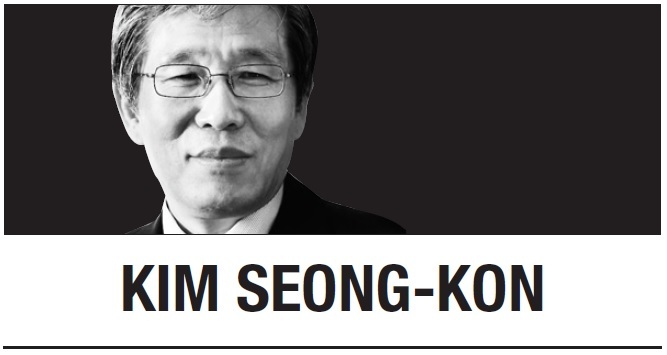[Kim Seong-kon] Remembering those who laid down their lives for us
By Kim Seong-konPublished : July 8, 2020 - 05:31

Recently, a friend sent me a succinct but powerful essay written by Lee Jung-woong, a former TBC producer, on the topic, “What is America to us?” The friend who thoughtfully sent me this essay wrote that she read it many times and every time she read it, she felt ashamed of not being grateful enough to the American soldiers who died for us during the Korean War. While reading the heart-rending essay, I, too, felt ashamed.
Based on the testimony of the late Gen. Chae Mying-shin, Lee unfolded the following story. When Gen. James Van Fleet served in Korea as commander of the US 8th Army during the Korean War, his son James Van Fleet Jr., a US Air Force lieutenant, volunteered to serve in Korea. On the battlefield, Lt. Van Fleet wrote to his mother, “Dear Mom, I hope this letter will not be wet with your tears. My father is fighting for the rights of human beings to live without fear. It is only natural that I have joined him in this fight. Please pray not for me, but for my crew in the B-26 bomber. They have young wives or girlfriends anxiously waiting for their safe return.”
Sadly, it was his last letter to his mother. Near the Yalu River in North Korea, his bomber suddenly disappeared from the radar, presumably shot down by the enemy anti-aircraft artillery. Upon receiving the report that his son’s bomber went missing, Gen. Van Fleet gave an order to stop the rescue mission because he thought it might cost more lives to save his son behind enemy lines. That Easter, Gen. Van Fleet wrote to the parents of those missing in action, quoting from the Bible, “There is no greater love than to lay down one’s life for one’s friends.”
Then, Lee portrays another moving incident, quoting from former Maj. T.R. Ferenbach’s memoir, “This Kind of War.” During the Korean War, President-elect Dwight Eisenhower visited the US Army headquarters in Korea. At a conference with military generals, Eisenhower abruptly asked, “Where is my son, Maj. Eisenhower, stationed?” Gen. Van Fleet answered, “He is at the 3rd Division in the front line, sir.” Then Eisenhower said rather solemnly, “I want him to transfer to a rear base.” Initially, the generals assumed that Eisenhower wanted to protect his son.
However, that was not the case. The president-elect calmly revealed his true intention, “If my son becomes KIA (killed in action), it would be an honor for me and my family. If he became a prisoner, however, it would be a disgrace. North Koreans will surely use him as a hostage and demand outrageous things. Then my fellow Americans will want me to meet our enemy’s demands in order to save their president’s son. I do not want such a situation.”
In 1949, Gen. Omar Bradley, chair of the Joint Chiefs of Staff, reported that South Korea was a place of no strategic value to the United States. When the Korean War broke out, however, the US government decided to send its young people to save South Korea. According to the Pentagon, 36,913 American soldiers died in action during the Korea War, 103,284 were wounded and 8,177 were missing in action, presumably dead. Lee pointed out that the number of US generals’ sons who fought in the Korean War was 142. Among them, 35 died in action. Capt. Clark, son of Gen. Mark Clark, commander of the UN forces in Korea, also died soon after his honorable discharge due to serious wounds he suffered from the Korean War.
Lee wrote, “Considering those numerous American soldiers who sacrificed for us, it was a shame that we demonstrated vehemently, yelling, ‘Americans, go home!’ when two school girls accidentally died from a traffic accident caused by a US tank during a military drill.” Of course, the two girls’ lives were precious and we should mourn for them. Nevertheless, we should have thought about those young Americans who died for us during the Korean War, before we had joined the national frenzy of anti-American sentiment.
Being grateful has nothing to do with pro-American sentiment or conservatism. Rather, it involves integrity, humanity and common sense. Instead of being thankful, radicals in our society wrongfully accuse American soldiers who fought for us during the Korea War as if they were mass murderers and civilian killers. The irony is that while preaching anti-Americanism, they have surreptitiously sent their children to the United States to study. Those people are not only insolent ingrates but also brazen hypocrites who lack decency and code of honor. We cannot let such confidence men beguile us. America is our blood ally and we should conduct ourselves accordingly.
South Korea’s freedom was not free. Today, we can relish freedom, thanks to the noble blood of those who sacrificed for us. Therefore, we should honor them and remember them forever. Otherwise, we will be impudent ingrates in the eyes of the international community.
Kim Seong-kon
Kim Seong-kon is a professor emeritus of English at Seoul National University and a visiting scholar at Dartmouth College. -- Ed.
Being grateful has nothing to do with pro-American sentiment or conservatism. Rather, it involves integrity, humanity and common sense.






![[KH Explains] How should Korea adjust its trade defenses against Chinese EVs?](http://res.heraldm.com/phpwas/restmb_idxmake.php?idx=644&simg=/content/image/2024/04/15/20240415050562_0.jpg&u=20240415144419)











![[Today’s K-pop] Stray Kids to return soon: report](http://res.heraldm.com/phpwas/restmb_idxmake.php?idx=642&simg=/content/image/2024/04/16/20240416050713_0.jpg&u=)